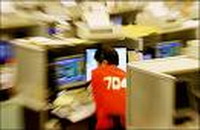Global stock markets concerned about Wall Street losses and credit crisis
Global stock markets are worried about losses on Wall Street and residual effects of the credit crisis and the strength of the U.S. economy.

The data from the U.S. labor department showed that employers boosted their payrolls by a surprisingly strong 166,000 in October, the most in five months, in a positive sign for the nation's employment climate amid the strains of a housing collapse and credit crunch.
In Europe, the FTSE-100 index in London dropped 0.8 percent to 6,530.60, while Germany's DAX index fell 0.4 percent to 7,849.49 and France's CAC-40 index declined 0.2 percent to 5,720.42.
The Dow Jones industrial average fell 0.1 percent to 13,548.85, after falling more than 100 points earlier in the session. Broader stock indicators were mixed.
In Asia, markets plummeted as investors worried about a possible end to U.S. interest rate cuts and a slowing American economy. Hong Kong's benchmark index plunged over 3 percent and markets in Japan, China, South Korea and Singapore fell more than 2 percent.
Repeating a pattern seen several times this year, a sharp selloff in U.S. stocks Thursday prompted investors to dump shares. The Dow Jones industrial average tumbled more than 360 points Thursday as investors reacted nervously to surging oil prices and a smaller-than-expected gain in U.S. consumer spending for September.
A warning about inflation Wednesday from the U.S. Federal Reserve when it cut rates also triggered concern that the U.S. central bank might hold off on further rate cuts or even consider raising them if inflation accelerates. That is renewing worries about a slowdown in the U.S. economy - a vital market for exporters.
"I'm not expecting a serious selloff, but I think Asian markets are responding to a genuine change in the overall outlook - that the Fed is not going to be as aggressive in cutting rates," said Tim Rocks, Asia Strategist at Macquarie Bank in Hong Kong.
"But you'll certainly see a slower pace in gains," Rocks said. "The Fed's attitude is going to put a lid on markets."
Jitters over the fallout from the subprime mortgage crisis - which roiled markets in August - will linger for a while, traders said.
Japan's benchmark Nikkei 225 index tumbled 352.92 points, or 2.1 percent, to finish at 16,517.48, dragged down by financial shares. Mitsubishi UFJ Financial Group dropped 6 percent following a recent revision of its profit outlook on weak domestic lending, while Mizuho Financial Group fell 5.7 percent.
Banking shares in London followed the trend, with Barclays dropping 6 percent and Royal Bank of Scotland off 4.7 percent. HSBC fell 2.1 percent.
In Hong Kong, the blue chip Hang Seng Index sank 3.25 percent to close at 30,468.34. The index is still up 52.6 percent this year. The benchmark Shanghai Composite Index fell 2.3 percent, while Singapore's Straits Times index fell 2.3 percent to 3,715 and the Korea Composite Stock Price Index, or Kospi, fell 2.1 percent to close at 2,019.34.
The stunning ascent this year in many Asian markets has been punctuated by occasional drops, usually sparked by plunges on Wall Street, which seem to be taken as cues by investors to unload shares that may have risen too high, too quickly. So far this year, each time Asian markets have dropped sharply, nearly all have quickly bounced back and climbed higher.
Subscribe to Pravda.Ru Telegram channel, Facebook, RSS!


